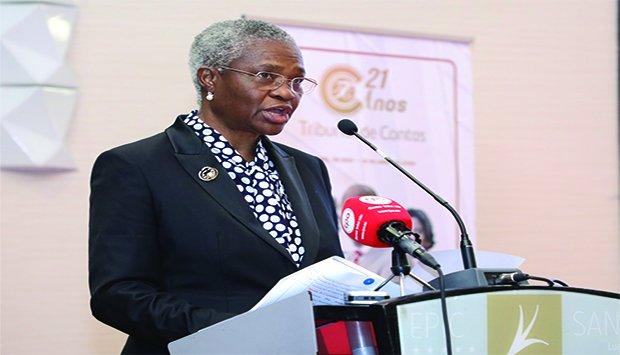Africa-Press – Angola. The creation of a specialized room for the Court of Auditors’ cases in the courts of first instance was defended, this Tuesday (12), in Luanda, by the President of the Court of Auditors (TC), Exalgina Gambôa, as a qualitative resource. that there would be greater dynamics in the treatment and monitoring of the processes.
Exalgina Gambôa, which also includes the creation of a more dynamic and timely procedure for verifying the accounts, considered important innovations, within the scope of the Court’s action, with a view to the approval, by the National Assembly, of the new version of the Organic Law , which will bring gains to the State, public managers and society in general. “The regulation of financial liability and, in particular, reintegration, objectively proposes “speedy mechanisms for the execution of sentences”, said judge Exalgina Gambôa.
Speaking at the ceremony of the 21st anniversary of the Court of Auditors, held in one of the hotels in Luanda, Exalgina Gambôa underlined, by the way, that the new version of the Organic Law and the Functioning of the Court of Auditors, already approved by the Justice Reform Commission , will give “proper treatment” to issues of a structural nature, which do not contribute to the full performance of the institution’s functions. The magistrate indicated that the institution’s work seeks to reverse the trajectory of bureaucratic processes with long waiting periods for decisions due to mechanisms and procedures that, in her opinion, “need to be updated and modernized”.
The venerable TC judge said that the new draft law deals, in a “clearer and more systematic” way, with the different matters that seek to regulate aspects of a substantive, procedural and organizational nature.
The President of the Court of Auditors, Exalgina Gambôa, while highlighting the presence of several entities, such as the Portuguese counterpart, reaffirmed the Court’s willingness to deepen technical cooperation with Portugal in the area of performance and regularity audits, having announced, shortly , the signing of a bilateral cooperation protocol.
He highlighted the support that the institution he has been directing for five years has benefited from international and regional organizations for external control, as well as the gains made by the Court of Auditors, in the context of the inspection of the State’s financial resources.
The project to revise the Organic Law on the Procedure of the Court of Auditors, the impact of the Covid-19 pandemic on the financing of public policies in Portuguese-speaking countries, and the effectiveness of financial responsibility in the management of public finances, were the main themes of the event, also witnessed by deputies from various benches, presidents of higher courts, members of the Executive and heads of judicial institutions.
The ceremony was attended by the Minister of State and head of the Military House of the President of the Republic, Francisco Furtado, the Minister of State for the Social Area, Carolina Cerqueira, the President of the Constitutional Court, Laurinda Cardoso.
Execution of decisions in financial matters
The effectiveness and execution of decisions on reinstatement financial responsibility and the adaptation of the career regime are the most complex points of the Project for Revision of the Organic Law and of the Court of Auditors’ Procedure, according to the member of the Commission for the Reform of Justice and Law, Carlos Feijó.
The jurist made these statements in his presentation during the seminar with the motto “O Guardian of the External Inspection of Public Finances”, promoted yesterday by the Court of Auditors, within the framework of the 21st anniversary celebrations, and recognized the significant advances in the division of competences.
According to Carlos Feijó, one of the most complex points concerns the questioning of the fact that the Court of Auditors is itself the one to execute its decisions, considering it “the most serious”, given that, in the initial proposal, it was the relationship between the failure to comply with a conviction and certain types of processes in progress in the country, especially those related to the recovery of assets. He recalled that the possibility for the Court of Auditors to collaborate closely with the Asset Recovery Process, as a preventive and more effective way of complying with its decisions, was almost a reference to Law 15/18 of 26 December (Law on Repatriation), but that, at that time, it was clearly perceived that it was “a violation of the principle of legality of procedural forms”.
The fact that the Court of Auditors is a sovereign body, directly constitutionalized, stressed Carlos Feijó, would not prevent the Constitution from dividing and distributing, among the various courts integrated in the jurisdictional function, its own powers, and, in this way, the Court de Contas would only be left with the role of supreme body for supervising the legality of public finances, without the competence that the other jurisdictional bodies, namely the bodies of common jurisdiction, regarding the execution of court decisions, would exercise. “Taking the executive process out of the ordinary jurisdictional courts and taking it to the Court of Auditors, we find a serious and flagrant violation of the constitutional principle of division of competences and a sprain to all our jurisdictional achievement,” he said.
For More News And Analysis About Angola Follow Africa-Press






